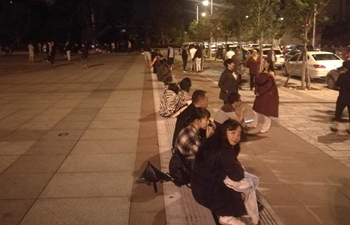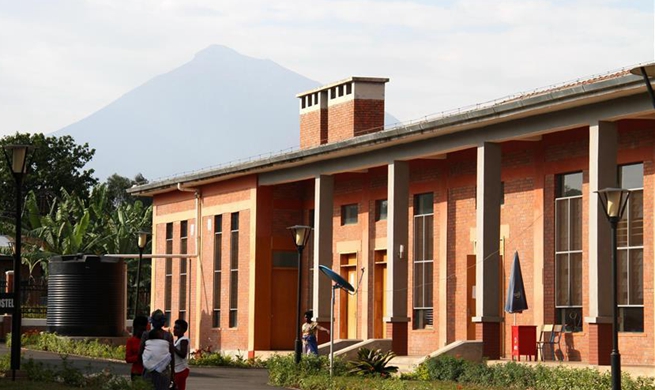HEFEI/CHANGSHA, Aug. 14 (Xinhua) -- Cao Jing is used to being rejected, even by the same person over and over again.
"We have lived together for over two decades. It's all meaningless if I cannot even protect his body," a woman cried after Cao asked her permission for her husband's organs to be donated.
Cao is an organ transplant coordinator, a key role in the success of an organ donation and transplant program, in a hospital east China's Anhui Province. She helps recipients look for potential donors, and is responsible for the whole transplant process once an organ is matched.
For Cao and her colleagues, the most difficult part of the job is to console the families of the patients and persuade them to donate the organs. In China, even if a patient has registered as an organ donor, the donation can only be done with the consent of their family.
Organ donation is a sensitive topic that people do not like to discuss openly in China. In the Chinese culture, a person's body should remain intact, because they believe there is afterlife.
"I will not give up, but I think they need more time," said Cao. "In fact, there's only a one-in-10 chance that they will be a match," she added.
Though her efforts ended in vain, Cao returned to the ICU and checked the patient's information. "The patient is 46 years old and had no serious health problems. All organs are in a stable condition," she repeated.
The patient has been declared brain dead and is completely reliant on a ventilator and medicine to maintain a regular heartbeat, according to Tao Xiaogen, the patient's doctor.
"A patient like this can help at least five people by donating two kidneys, a liver, and a pair of corneas," said Cao.
But Cao herself is somewhat ambivalent. On the one hand, she hopes the patient can recover; on the other, she wishes patients diagnosed brain dead can have their organs donated to save more lives.
Guo Yong, a coordinator in central China's Hunan Province, also feels himself struggling in moods between joy, anxiety, depression, and hope every day.
"Almost every donor I meet died from an accident or a sudden illness, so it's very painful for their families to make the decision. I sometimes become very sensitive and depressed standing there witnessing how desperate they are," said Guo.
"Very often I feel I'm too tired to carry on, but I regain my confidence once another life is saved," said Guo.
Data from the National Health Commission showed about 1.5 million patients suffer from organ failure in China every year, of whom one-fifth are suitable for an organ transplant. However, only 10,000 such transplants are done annually.
So the coordinators are vital to push for wider acceptance of organ donation in China.
Guo joined the team of transplant coordinators in Hunan in 2011. The 34-year old has handled over 100 transplant cases over the past seven years.
"Most of the time we're on the road to different hospitals around the province, as we have to juggle between various departments for a case. I have had two cars break down. The newest was purchased a year ago and has already run over 70,000 km," said Guo.
"Driving too much has left me with a serious lumbar muscle strain. Every time it hits, I have to lie in bed for about 10 days and that's often the only vacation I get," Guo said with a bitter smile.
"Our phones are on 24 hours a day because every donation is a race against time. An organ should be harvested in half an hour or it may not function well," said Liu Zhe, Cao's colleague.
"There are more than 200 procedures involved from discovering a potential donor to a successful transplantation, and every step needs the participation of transplant coordinators," said Yao Ziqin, head of the Organ Procurement Organization (OPO) office at a hospital in Anhui. "On the day of the donation, coordinators might have to make up to 100 phone calls to communicate between different departments."
The OPO office Yao works at was established in March last year and has already helped complete 44 organ donations. Nationwide, a total of 2,200 registered coordinators have saved more than 50,000 lives since China initiated the organ donation program in March 2010, according to Wang Jianfeng with the Red Cross Society of Anhui.
In addition, an online system -- China Organ Transplant Response System -- was launched in 2013. It can automatically search for the best-matched registered donor for a patient, which has significantly increased the efficiency of organ transplant.
According to the Red Cross Society of China, the number of organ donors reached 5,177 in 2017, from just 34 in 2010, but there is still a long way to go.
"On average, every one out of every five people we approach will agree to donate, so I began giving lectures on organ donation at hospitals in 2015 to help more people understand and support organ donation," said Guo.
"I wish one day the concept of organ donation will be widely accepted and our job would be much easier and more recognized," he said.
"Every successful donation does not come easy, I will definitely keep trying to get permission from the families," Cao said.

















